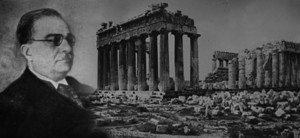
The past in Metaxas’ ideology
 In his The Past is a Foreign Country (Cambridge 1985), David Lowenthal has demonstrated that whether by celebrating some of its aspects [or] expunging others, we reshape the past in line with present needs. Forty-three years earlier, the future kyvernitis of Greece, Ioannis Metaxas, had opined that to study the past has no other value than that which present needs bestow upon it.
In his The Past is a Foreign Country (Cambridge 1985), David Lowenthal has demonstrated that whether by celebrating some of its aspects [or] expunging others, we reshape the past in line with present needs. Forty-three years earlier, the future kyvernitis of Greece, Ioannis Metaxas, had opined that to study the past has no other value than that which present needs bestow upon it.
Drawing upon the corpus of Metaxas speeches and reflections as well as representative publications of the Fourth of August Regime, I will discuss the role which the past played in the construction and articulation of the Metaxas regime’s ideology, and seek to assess the extent to which the past was conceptualized as a myth, designed to serve the exigencies of the present.
The immediate past -the period from the 1830s up to 1936, but principally the inter-war years with the double yoke of parliamentarism and communism- is unequivocally condemned as divisive and used to legitimate the establishment of the dictatorship. It is always referred to in contradistinction to the present, which is deified as the embodiment of national regeneration (anagennisis) and unity and heralded as a landmark in the country’s history: a radical break with the past and a point of no return.
On the other hand, eras and aspects of the more distant past are selectively drawn upon to form the ideological contour of the New State. Predictably the glory that was ancient Greece is invariably celebrated as the fountain of civilization into whose crystal clear and pure waters the contemporary Greeks ought to be re-baptized, so as to become again Hellenes.
But whereas ancient Athens is seen as the archetype of intellectual and artistic development, Athenian democracy is castigated as an ignominious failure that led to the Peloponnesian War; a system of social organization characterized by mediocrity and deriving its strength from amorphous and misguided masses; a decadent legacy which survived in modern Greece through the Tourkokratia. Yet this outright condemnation of Athenian democracy fails to explain how as a social system it produced precisely those intellectual achievements that the Fourth of August Regime holds in high esteem.
It is ancient Sparta and ancient Macedonia that are eulogized for bequeathing the national ideals of political unity and territorial integrity upon which the New State was to be build. The Spartan model of self-discipline, prowess and obedience to the state, in particular, become the principal paradigm of the regime; and the promise we shall surpass you, which young Spartans gave their fathers before the latter went to war, is evoked to galvanize the youths belief in the country’s progress.
Similarly, medieval Hellenism, in other words Byzantium, is praised for forging a religious ideal which was instilled in millions, while its supposed deficiency in scientific and artistic achievements is compensated for by its creation of a powerful state. Used and distorted, embellished or cancelled, celebrated or rejected, attended to or ignored, the past emerges as omnipresent, an integral part of the Third Hellenic Civilization, as Metaxas grandiloquently dubbed the Greece that his regime would create in the long term.
– Philip Carabott
(For deeper insights into this topic, see Monumental Visions – The Past in Metaxas Weltanschauung, also by this author)